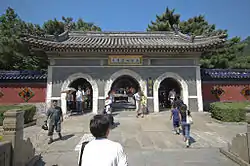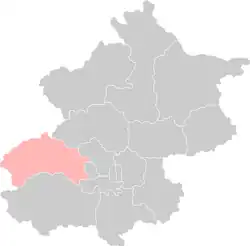Mentougou, Beijing
Mentougou District (simplified Chinese: 门头沟区; traditional Chinese: 門頭溝區; pinyin: Méntóugōu Qū) is a district in western Beijing. Spanning 1,321 square kilometres (510 sq mi), with 266,591 inhabitants (2000 Census), it is subdivided into 4 subdistricts and 9 towns. It borders the Beijing districts of Changping to the northeast, Haidian and Shijingshan to the east, Fengtai to the southeast, and Fangshan to the south, as well as Hebei province to the west and northwest.
Mentougou
门头沟区 | |
|---|---|
 Tanzhe Temple's Entrance | |
 Location of Mentougou District in Beijing | |
| Coordinates (Mentougou government): 39°56′25″N 116°06′05″E | |
| Country | People's Republic of China |
| Municipality | Beijing |
| Township-level divisions | 4 subdistricts 9 towns |
| Area | |
| • Total | 1,321 km2 (510 sq mi) |
| Population (2000) | |
| • Total | 266,591 |
| • Density | 200/km2 (520/sq mi) |
| Time zone | UTC+8 (China Standard) |
| Area code | 0010 |
It lies in the Western Hills of Beijing and is mountainous in terrain. In fact, the mountainous terrain—including a hundred or more peaks—occupy a stunning 93% of the entire area.
It is a treasure trove of natural resources, including coal, limestone, and granite. Mentougou also supplies Beijing with agricultural produce such as roses, wild jujubes, mushrooms, and Beijing white pears.
The district was purely a rural area well into the early 1990s and was not considered as part of Beijing by the urban population, and as of today, many parts of Mentougou remain quite rural.
Mining is one of the key industrial activities. Around 10 medium and large mining companies once operated in Mentougou, but some of them have ceased operations as mineral deposits have been depleted. The first known mining activity in Mentougou was documented during the Ming Dynasty.
Tourism
Mentougou District is gaining popularity as a tourist destination. Among its main sights are Jietai Temple, Tanzhe Temple, Longmen Gully (or Canyon), Mount Baihua, Mount Ling (the highest mountain in Beijing at 2,303 metres), Mount Miaofeng, and Cuandixia Village.
Transport
Road
The 6th Ring Road runs through the eastern part of Mentougou District.
Metro
Mentougou District is served by one line of the Beijing Subway.
Administrative divisions
There are 4 subdistricts and 9 towns (including 3 towns of which carry the "area" label):[1]
| Name | Chinese (S) | Hanyu Pinyin | Population (2010)[2] | Area (km2) |
|---|---|---|---|---|
| Dayu Subdistrict | 大峪街道 | Dàyù Jiēdào | 80,413 | 4.40 |
| Chengzi Subdistrict | 城子街道 | Chéngzi Jiēdào | 34,555 | 2.90 |
| Dongxinfang Subdistrict | 东辛房街道 | Dōngxīnfáng Jiēdào | 27,335 | 18.00 |
| Datai Subdistrict | 大台街道 | Dàtái Jiēdào | 11,296 | 81.00 |
| Wangping (town) Area | 王平(镇)地区 | Wángpíng (Zhèn) Dìqū | 6,513 | 46.00 |
| Yongding (town) Area | 永定(镇)地区 | Yǒngdìng (Zhèn) Dìqū | 42,446 | 68.60 |
| Longquan (town) Area | 龙泉(镇)地区 | Lóngquán (Zhèn) Dìqū | 32,149 | 49.00 |
| Tanzhesi town | 潭柘寺镇 | Tánzhèsì Zhèn | 8,672 | 73.20 |
| Junzhuang town | 军庄镇 | Jūnzhuāng Zhèn | 12,516 | 34.00 |
| Yanchi town | 雁翅镇 | Yànchì Zhèn | 6,587 | 239.00 |
| Zhaitang town | 斋堂镇 | Zhāitáng Zhèn | 10,817 | 392.40 |
| Qingshui town | 清水镇 | Qīngshuǐ Zhèn | 7,906 | 339.00 |
| Miaofengshan town | 妙峰山镇 | Miàofēngshān Zhèn | 9,271 | 110.00 |
Education
Climate
Mentougou District has a humid continental climate (Köppen climate classification Dwa). The average annual temperature in Mentougou is 12.5 °C (54.5 °F). The average annual rainfall is 568.1 mm (22.37 in) with July as the wettest month. The temperatures are highest on average in July, at around 26.2 °C (79.2 °F), and lowest in January, at around −3.4 °C (25.9 °F).
| Climate data for Mentougou District (1991–2020 normals, extremes 1981–2010) | |||||||||||||
|---|---|---|---|---|---|---|---|---|---|---|---|---|---|
| Month | Jan | Feb | Mar | Apr | May | Jun | Jul | Aug | Sep | Oct | Nov | Dec | Year |
| Record high °C (°F) | 14.7 (58.5) |
19.3 (66.7) |
28.1 (82.6) |
32.1 (89.8) |
37.4 (99.3) |
39.9 (103.8) |
41.8 (107.2) |
37.2 (99.0) |
34.8 (94.6) |
30.7 (87.3) |
22.0 (71.6) |
20.3 (68.5) |
41.8 (107.2) |
| Average high °C (°F) | 2.4 (36.3) |
6.1 (43.0) |
13.0 (55.4) |
20.9 (69.6) |
27.1 (80.8) |
30.6 (87.1) |
31.4 (88.5) |
30.4 (86.7) |
26.2 (79.2) |
19.2 (66.6) |
10.4 (50.7) |
3.8 (38.8) |
18.5 (65.2) |
| Daily mean °C (°F) | −3.0 (26.6) |
0.3 (32.5) |
7.1 (44.8) |
14.9 (58.8) |
21.1 (70.0) |
24.9 (76.8) |
26.6 (79.9) |
25.4 (77.7) |
20.3 (68.5) |
13.2 (55.8) |
4.8 (40.6) |
−1.4 (29.5) |
12.9 (55.1) |
| Average low °C (°F) | −7.4 (18.7) |
−4.7 (23.5) |
1.4 (34.5) |
8.5 (47.3) |
14.5 (58.1) |
19.4 (66.9) |
22.2 (72.0) |
21.0 (69.8) |
15.3 (59.5) |
8.0 (46.4) |
0.2 (32.4) |
−5.6 (21.9) |
7.7 (45.9) |
| Record low °C (°F) | −19.8 (−3.6) |
−16.4 (2.5) |
−12.1 (10.2) |
−2.9 (26.8) |
4.0 (39.2) |
9.2 (48.6) |
13.7 (56.7) |
12.3 (54.1) |
4.2 (39.6) |
−4.5 (23.9) |
−11.3 (11.7) |
−16.0 (3.2) |
−19.8 (−3.6) |
| Average precipitation mm (inches) | 2.0 (0.08) |
5.2 (0.20) |
9.3 (0.37) |
20.5 (0.81) |
36.3 (1.43) |
84.9 (3.34) |
202.9 (7.99) |
112.0 (4.41) |
55.6 (2.19) |
24.5 (0.96) |
13.0 (0.51) |
2.4 (0.09) |
568.6 (22.38) |
| Average precipitation days (≥ 0.1 mm) | 1.3 | 2.2 | 3.0 | 4.6 | 6.1 | 10.5 | 13.1 | 10.7 | 7.3 | 5.2 | 3.0 | 1.6 | 68.6 |
| Average snowy days | 2.3 | 2.3 | 1.1 | 0.2 | 0 | 0 | 0 | 0 | 0 | 0 | 1.6 | 2.2 | 9.7 |
| Average relative humidity (%) | 42 | 41 | 39 | 41 | 47 | 58 | 71 | 73 | 67 | 59 | 52 | 44 | 53 |
| Mean monthly sunshine hours | 173.4 | 171.7 | 208.9 | 223.5 | 242.8 | 193.1 | 158.7 | 176.5 | 187.9 | 181.6 | 155.5 | 163.3 | 2,236.9 |
| Percent possible sunshine | 58 | 56 | 56 | 56 | 54 | 43 | 35 | 42 | 51 | 53 | 53 | 56 | 51 |
| Source: China Meteorological Administration[3][4] | |||||||||||||
References
- "中国国家统计局". Archived from the original on 2021-05-10.
- Census Office of the State Council of the People's Republic of China; Population and Employment Statistics Division of the National Bureau of Statistics of the People's Republic of China (2012). 中国2010人口普查分乡、镇、街道资料 (1 ed.). Beijing: China Statistics Print. ISBN 978-7-5037-6660-2.
- 中国气象数据网 – WeatherBk Data (in Simplified Chinese). China Meteorological Administration. Retrieved 26 August 2023.
- 中国气象数据网 (in Simplified Chinese). China Meteorological Administration. Retrieved 26 August 2023.
